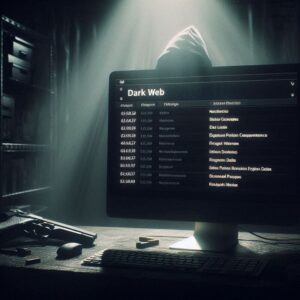Dive Deep into Dark Web Investigations: Exploring Its Complexities and Risks
The Dark Web represents a mysterious and often misunderstood segment of the internet, wrapped in layers of secrecy and generally unreachable through standard search engines. To navigate this concealed network, users must utilize specific software, configure their devices uniquely, or obtain special permissions, which adds to its intrigue. This hidden territory is distinguished by high levels of user anonymity and untraceability, making it a fertile ground for various illicit activities. Often linked to unlawful operations like drug trafficking, arms sales, and human trafficking, it also operates as a hub for cybercriminals who deal in stolen personal information, credit card details, and other sensitive data. Within this secretive space, individuals can engage in illegal transactions, participate in forbidden forums, and connect with communities that operate outside the bounds of the law, all while feeling shielded from law enforcement scrutiny.
In stark contrast to the familiar surface web, the Dark Web is constructed on a sophisticated framework that effectively masks users’ identities through advanced encryption methods and multiple layers of anonymity. To access this hidden digital world, most users rely on specialized software like Tor (The Onion Router), which anonymizes online activity by routing internet traffic through a network of volunteer-operated servers. This complex routing process significantly complicates the efforts of anyone attempting network surveillance or traffic analysis, creating formidable challenges to tracking a user’s location or activities. While the Dark Web can serve as a secure communication platform for whistleblowers and political dissidents seeking refuge, its notorious reputation primarily stems from its associations with criminal enterprises and illegal activities, presenting substantial obstacles for law enforcement agencies trying to maintain order.
Proven Strategies for Safely Navigating the Dark Web
- Recognize that the Dark Web is a hidden segment of the internet that necessitates specific software for access and is frequently associated with illegal activities.
- Understand that navigating the Dark Web involves considerable risks, including exposure to identity theft, financial fraud, and contact with explicit or harmful content.
- DarkSearch stands out as an essential tool, empowering users to explore the Dark Web safely with its anonymous search engine features.
- Be aware that while exploring the Dark Web, users may encounter a mixture of illicit products and services, stolen data, black market activities, and even legitimate content.
- To ensure safety when exploring the Dark Web, it is crucial to utilize a secure VPN, exercise extreme caution with links, and carefully manage personal data sharing.
Spotting and Mitigating Risks Associated with Dark Web Usage
The Dark Web introduces significant risks not only to individuals but also to society as a whole. It has become a central hub for criminal activities, including the rampant sale of narcotics, firearms, and stolen personal data, which further fuels various criminal organizations. This perilous environment heightens the risk of identity theft, financial fraud, and an array of other cybercrimes that can have devastating consequences for unsuspecting users. The anonymity provided by the Dark Web complicates law enforcement’s efforts to trace and capture offenders, giving cybercriminals a misleading sense of invulnerability.
Moreover, the Dark Web plays a troubling role in enabling human trafficking and exploitation. Its unregulated and anonymous nature creates a safe haven for traffickers, contributing to a disturbing increase in the online exploitation of vulnerable groups, especially young individuals who may be coerced into sex work or other forms of modern slavery. Additionally, the Dark Web often serves as fertile ground for extremist ideologies and terrorist propaganda, presenting serious threats to national security and public safety. This reality emphasizes the urgent need for continuous vigilance and proactive measures from society to counter these harmful trends.
The pervasive presence of illicit activities on the Dark Web has far-reaching societal implications. It fosters a culture of lawlessness that undermines efforts to create a secure online environment. Consequently, it is vital for users to remain aware of the inherent dangers associated with the Dark Web and to take proactive steps to shield themselves from its potentially harmful impacts.

Expert Strategies for Secure Dark Web Navigation Using DarkSearch
DarkSearch is a groundbreaking search engine meticulously crafted to help users explore the Dark Web securely and privately. This advanced tool allows individuals to search for specific content without compromising their anonymity or personal privacy. DarkSearch utilizes robust encryption and privacy protections, ensuring that users can navigate the Dark Web without the constant fear of being tracked or monitored by malicious actors.
One of DarkSearch’s standout features is its ability to provide users with a carefully curated selection of verified and trustworthy Dark Web websites. This function is invaluable in helping users avoid illegal or harmful content while directing them toward reputable resources and information. Additionally, DarkSearch includes built-in security measures designed to shield users from fraudulent sites and phishing scams, significantly reducing the risk of falling victim to cybercrime during their browsing experience.
Beyond enhancing security, DarkSearch opens up a treasure trove of information and resources typically hidden from the surface web. This includes niche forums, marketplaces, and communities dedicated to various interests, allowing users to connect with like-minded individuals in a secure and private setting. By harnessing the capabilities of DarkSearch, users can responsibly explore the Dark Web, deftly navigating around the pitfalls associated with illegal activities while still accessing valuable insights and information.

Discovering the Wide Array of Content on the Dark Web
The Dark Web is home to a vast array of content, encompassing both legitimate and illegal activities. Its infamous reputation largely stems from its role as a marketplace for illicit goods and services, such as the trade of drugs, firearms, counterfeit currencies, and stolen personal information. This secretive environment is particularly attractive to criminals who seek to conduct transactions while minimizing the risk of detection by law enforcement.
In addition to these illegal marketplaces, the Dark Web also hosts forums and groups that engage in discussions covering a wide range of topics, including hacking, cybercrime, political activism, and whistleblowing. These platforms offer individuals a secure space to discuss controversial subjects and share information without the fear of censorship or surveillance. However, they can also serve as breeding grounds for criminal behavior and extremist ideologies, posing significant risks to public safety and national security.
Despite its connections to illegal activities, the Dark Web fulfills essential roles. It provides a secure platform for whistleblowers and activists to disseminate critical information and shed light on issues related to corruption and human rights violations without the threat of retaliation. Furthermore, the Dark Web is rich with resources and information that may be censored or inaccessible on the surface web, making it an invaluable tool for those seeking uncensored knowledge and alternative viewpoints.
Essential Safety Protocols for Dark Web Exploration
While venturing into the Dark Web exposes users to various risks, numerous strategies can help mitigate these dangers. Utilizing specialized software like Tor enables safe browsing of the Dark Web. Tor encrypts your internet traffic, effectively hiding your location and online activities from any potential surveillance or traffic analysis, thereby providing users with an enhanced sense of privacy.
Practicing caution is vital during Dark Web exploration. It’s crucial to avoid clicking on unknown links or downloading files from dubious sources, as the Dark Web is rife with malicious sites designed to steal sensitive information or infect users’ devices with malware. Users can bolster their security by confining their visits to trusted and verified websites while navigating this hidden digital landscape.
Moreover, individuals should refrain from sharing personal information or engaging in transactions on the Dark Web. The inherent anonymity of this environment complicates the verification of merchants or buyers, significantly increasing the likelihood of scams and fraud.
Employing a virtual private network (VPN) can substantially enhance security while exploring the Dark Web. A VPN encrypts internet traffic and masks your IP address, making it more challenging for malicious actors to trace or monitor your online actions.
By adhering to these safety guidelines and maintaining vigilance during Dark Web explorations, users can significantly reduce their exposure to potential threats and safeguard themselves against the dangers associated with cybercrime.
Understanding Legal and Ethical Considerations When Using DarkSearch
When utilizing DarkSearch or engaging with the Dark Web, individuals must be acutely aware of the legal and ethical implications at play. Accessing certain types of content or participating in specific activities on the Dark Web may violate local laws or ethical standards, potentially resulting in serious legal consequences or moral dilemmas.
A critical legal consideration when using DarkSearch is the risk of stumbling upon unlawful content or activities. Users must realize that accessing illegal marketplaces or participating in criminal acts on the Dark Web can lead to severe legal repercussions, including prosecution and imprisonment. Therefore, exercising caution and adhering to local laws while exploring the Dark Web is paramount to avoiding unintentional legal violations.
Equally important is the understanding of the ethical ramifications associated with using DarkSearch. Users should be conscious of the dangers of engaging with harmful content or facilitating illegal actions on the Dark Web. This includes avoiding transactions involving illicit goods or services, steering clear of criminal enterprises, and promptly reporting any illegal activities encountered during their exploration.
When accessing sensitive data or discussing controversial topics on the Dark Web, it is vital to recognize the moral implications. Treating such subjects with care and empathy is essential, as it acknowledges the potential impact on individuals or communities affected by these issues.
By remaining vigilant and considering the legal and ethical factors while using DarkSearch, individuals can navigate the Dark Web responsibly and safely.

Anticipating Emerging Trends in the Dark Web: Innovations and Their Consequences
The future landscape of the Dark Web is set for significant advancements and implications that could profoundly shape its trajectory. As technology continues to evolve, concerns regarding the potential for increasingly sophisticated cybercriminal activities thriving within the Dark Web are on the rise. Innovations in encryption techniques, anonymization technologies, and decentralized networks may further complicate law enforcement’s ability to monitor and control illegal activities in this concealed realm.
Moreover, the importance of international collaboration in addressing the challenges posed by the Dark Web cannot be overstated. Given that illicit operations on the Dark Web frequently cross national borders, the need for cooperative efforts among governments, law enforcement agencies, and technology companies is critically important. This includes sharing intelligence, coordinating strategies, and establishing regulatory frameworks to mitigate the risks associated with the Dark Web, highlighting the essential roles played by each entity in tackling this global issue.
Additionally, ongoing discussions surrounding potential government interventions aimed at combating unlawful activities on the Dark Web while safeguarding individual privacy rights are gaining traction. Striking a balance between addressing cybercrime and protecting freedom of expression and internet privacy presents a complex challenge. As policymakers navigate these intricate considerations, they must prioritize informed decision-making to ensure that legislative measures effectively combat illegal activities on the Dark Web without infringing upon individual rights.
Future developments in the Dark Web will have profound implications for cybersecurity, law enforcement, personal privacy rights, and global security. By staying informed about potential trends and changes, individuals can better understand the evolving landscape of the Dark Web and take proactive steps to protect themselves from its associated threats.
Comprehensive Responses to Frequently Asked Questions About the Dark Web
What is a Dark Web search engine, and how does it work?
A Dark Web search engine is specifically designed to assist users in navigating the Dark Web, a hidden segment of the internet that is not indexed by conventional search engines. This tool empowers individuals to discover and access concealed websites and exclusive content typically unreachable through standard web browsers, enriching their exploration experience.
How do dark web search engines function?
Dark web search engines utilize specialized algorithms to crawl and index content located within the hidden corners of the Dark Web. These engines access concealed websites and extract information, making it searchable for users who wish to explore this hidden digital landscape more effectively and efficiently.
Is using a dark web search engine legal?
Utilizing a dark web search engine is not inherently illegal, as it serves merely as a tool for accessing content on the Dark Web. However, users must recognize that the Dark Web is often associated with illegal activities, and engaging with certain content or participating in unlawful actions may violate the law.
What risks accompany the use of a dark web search engine?
Several risks accompany the use of dark web search engines, including exposure to illegal and harmful content, potential malware attacks, and the threat of being targeted by cybercriminals. Exercising caution and implementing appropriate security measures is essential when accessing the Dark Web to mitigate these risks.
Can I access the Dark Web without using a dark web search engine?
Technically, it is possible to access the Dark Web without a search engine by using specialized software like Tor, which allows users to browse anonymously and reach hidden websites. However, utilizing a dark web search engine can simplify the process of finding specific content and enhance navigation through the Dark Web.
References:
Pros and Cons of Internet Usage – Good and Bad Effects. https://thetechprint.com/pros-and-cons-of-internet-usage
Is it Illegal to Access the Dark Web? – Exploring the Dark Corners of the Digital World: A Tale of Mexican Hackers. https://www.hackersmexicanos.com/is-it-illegal-to-access-the-dark-web/
The post Deep Search: Unveiling the Invisible Dark Web appeared first on Ezi Gold.
The Article: Dark Web Exploration: Discovering the Hidden Internet Depths Was Found On https://ai.ezi.gold
The Article Dark Web Exploration: Unveiling the Hidden Internet Secrets Was Found On https://limitsofstrategy.com


Your exploration of the Dark Web brings to light not only its risks but also the complexities of human behavior that drive individuals to seek out such hidden realms. It’s fascinating to consider that while many are drawn to the anonymity for illegal pursuits, there are also voices within these spaces advocating for privacy rights and freedom of expression, reflecting a broader societal struggle between security and liberty.
You’ve nailed it! The Dark Web really is a mixed bag—like a party where you’ve got people trading illicit items in one corner and privacy advocates discussing digital rights in another, all under the flickering lights of encrypted chat rooms. It’s like a weird digital version of a coffee shop where the barista is also a hacker.
You’ve hit upon a really interesting duality with the Dark Web. It’s like a digital microcosm where the extremes of human behavior are on full display. The anonymity it offers does indeed attract those looking to engage in illicit activities, but at the same time, it also serves as a refuge for people in oppressive regimes who rely on it to share information or organize movements. This complexity really emphasizes how technology evolves alongside societal needs, often in ways we might not predict.
It’s fascinating how the Dark Web is both a refuge for anonymity and a playground for illicit activities. I often wonder about the double-edged sword it represents—for some, it’s a way to escape oppressive regimes or share sensitive information safely, yet for others, it’s just a marketplace for harmful goods.